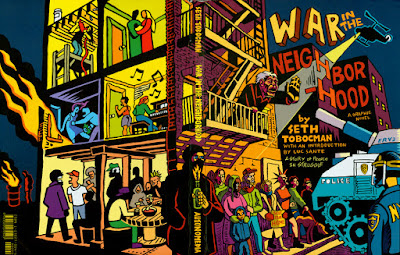New York's Lower East Side has had a long association with radical politics of anarchist, socialist or communist persuasions. By the late 70's up to 80% of the area's housing was abandoned and a squatter movement developed amid gentrification and a growing arts scene. Seth Tobocman's War in the Neighbourhood chronicles a period of intense activism and personal struggle of many of the squatters through the Reagan era up to the Mayoralty of Rudy Giuliani.
The New York City Department of Housing Preservation and Development (HPD) was set up in 1978, and took ownership of many LES buildings, ostensibly to turn them into 'affordable housing'. Tobocman recounts how ultimately yuppies started moving in and the poor were evicted. The acronym came to mean instead Housing Prevention and Destruction for those opposed to the process.
Battles raged for the rights of the homeless, the right to walk a dog at night in the local park, to not be attacked by police and to not have the abandoned building you called home be demolished. There are also deeply personal stories with people of many different backgrounds forced together out of the shared need for housing. Problems of drugs, HIV, racial bias, police violence and domestic violence abound. The lyrics of Grandmaster Flash's 'The Message' come to mind: "Got no money to move out, I guess I got no choice."
Tobocman's style is bold high contrast black and white. What it lacks in detail it makes up for in expressiveness. The text is often written over the surfaces of walls, doors, stairs and furniture, as though the locations themselves hold the memories of the events that occurred there. A strong theme throughout is the difficulty in keeping the peace between different personalities and factions while staying true to one's principles. The road to democracy and true community is through struggle against oppression, to learn from one's mistakes and to also know ourselves.
Tobocman is also the co-founder of comics anthology magazine World War Three Illustrated. Collectively run since 1979, and continuing to this day, it features artists with a left-wing focus covering issues such as housing rights, feminism, the environment, religion, police brutality, globalization, and global conflict zones.
Tobocman is also the co-founder of comics anthology magazine World War Three Illustrated. Collectively run since 1979, and continuing to this day, it features artists with a left-wing focus covering issues such as housing rights, feminism, the environment, religion, police brutality, globalization, and global conflict zones.

No comments:
Post a Comment